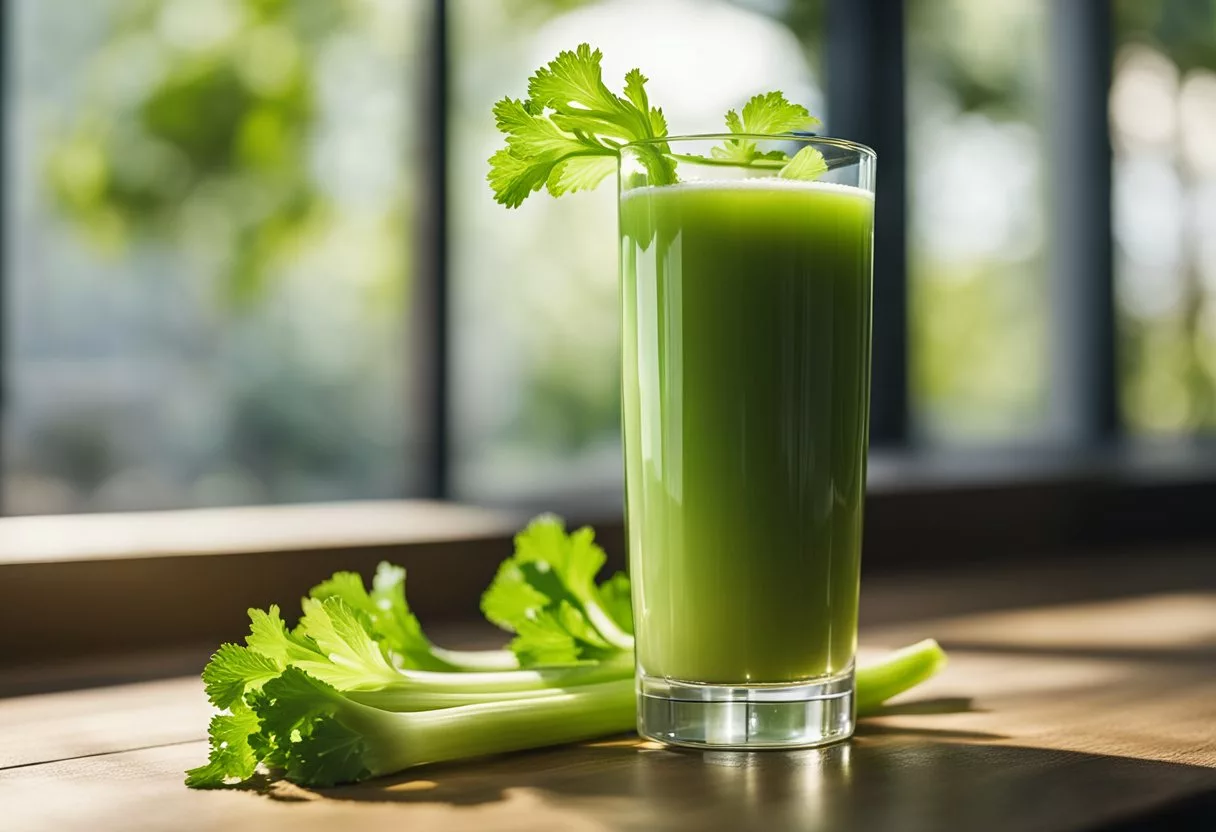Drinking celery juice every day has become a popular health trend in recent years. Many people claim that it has numerous benefits, including weight loss, reduced inflammation, and improved digestion. But what really happens to your body when you drink celery juice every day?
 [1]
[1]Introducing Sugar Defender[2], an advanced blend of 24 proven ingredients that support healthy glucose levels and natural weight loss.
According to some experts, celery juice is high in antioxidants, vitamins, and minerals that can help improve overall health. It is also believed to have anti-inflammatory properties that can reduce the risk of chronic diseases. However, it is important to note that there is limited scientific evidence to support these claims.
Despite the lack of conclusive evidence, many people continue to drink celery juice every day and report positive effects on their health. In this article, we will explore the potential benefits and drawbacks of drinking celery juice every day, based on the available scientific research and anecdotal evidence.
Understanding Celery Juice

Nutritional Profile of Celery
Celery is a low-calorie vegetable that is high in essential vitamins and minerals. According to the USDA, one cup of chopped celery (101 grams) contains:
- Calories: 16
- Protein: 0.7 grams
- Fat: 0.2 grams
- Carbohydrates: 3 grams
- Fiber: 1.6 grams
- Vitamin A: 9% of the Daily Value (DV)
- Vitamin C: 5% of the DV
- Vitamin K: 37% of the DV
- Folate: 9% of the DV
- Potassium: 8% of the DV
Celery is also a good source of antioxidants, including flavonoids and phenolic acids. These compounds have been shown to have anti-inflammatory and anti-cancer properties.
The Juicing Process
Juicing is a popular way to consume fruits and vegetables, including celery. The juicing process involves extracting the liquid from the celery and separating it from the pulp. This results in a concentrated form of celery juice that is easier to digest than whole celery.
However, the juicing process also removes the fiber from the celery. Fiber is an important nutrient that helps regulate digestion and promote feelings of fullness. Without fiber, celery juice may not be as filling as whole celery, which could lead to overconsumption of calories.
Celery Juice vs. Whole Celery
While celery juice has many purported health benefits, it is important to note that whole celery also provides important nutrients and fiber. Eating whole celery can help promote feelings of fullness and aid in digestion, while celery juice may be easier to digest and provide a concentrated source of vitamins and minerals.
Overall, incorporating celery into a balanced diet can be a healthy choice. However, it is important to consume a variety of fruits and vegetables to ensure adequate intake of all essential nutrients.
Health Benefits of Daily Consumption

Celery juice has gained popularity in recent years due to its potential health benefits. While more research is needed to confirm these benefits, some studies suggest that drinking celery juice daily may have positive effects on various aspects of health.
Hydration and Electrolyte Balance
Celery juice is mostly water, making it a hydrating drink that can help maintain electrolyte balance in the body. It contains potassium and magnesium, two essential minerals that play a role in regulating fluid balance and muscle function. Drinking celery juice can help replenish these minerals and keep the body hydrated.
Anti-inflammatory Effects
Celery juice contains antioxidants and phytochemicals that have anti-inflammatory properties. Chronic inflammation has been linked to various health problems, including heart disease, cancer, and autoimmune disorders. Drinking celery juice daily may help reduce inflammation in the body and prevent these conditions.
Digestive Health
Some people claim that drinking celery juice can improve digestion and alleviate digestive problems such as bloating, constipation, and acid reflux. While there is limited scientific evidence to support these claims, celery juice may help promote digestive health by providing fiber and other nutrients that support gut health.
Heart Health and Blood Pressure
Celery juice may have benefits for heart health and blood pressure. It contains compounds that have been shown to lower cholesterol levels and improve circulation. Additionally, celery juice may help lower blood pressure by relaxing the tissues of the artery walls. Drinking celery juice daily may help reduce the risk of heart disease and stroke.
Liver Function and Detoxification
Celery juice is often touted as a detoxifying drink that can help improve liver function. While more research is needed to confirm these benefits, celery juice contains compounds that may help protect the liver from damage and support its detoxification processes. Drinking celery juice daily may help improve liver function and promote overall health.
In summary, drinking celery juice daily may have various health benefits, including hydrating the body, reducing inflammation, promoting digestive health, improving heart health and blood pressure, and supporting liver function and detoxification. However, more research is needed to confirm these benefits and determine the optimal amount of celery juice to consume for maximum health benefits.
There is supporting evidence associating celery consumption with a variety of health benefits like improving metabolic syndrome, including insulin action, glucose control, lipid metabolism, and blood pressure. For a complete review of benefits go to the following article found in Phytotherapy Research[4].
Potential Risks and Considerations

Sodium Content and Hypertension
Celery juice is naturally low in sodium, but it still contains some sodium. According to WebMD[5], an 8-ounce serving of celery juice contains 189 milligrams of sodium. While this amount is not considered high, people who are on a low-sodium diet or have high blood pressure may want to limit their intake of celery juice.
Interactions with Medications
Celery juice may interact with certain medications, including blood thinners and diuretics. People who are taking these medications should talk to their doctor before adding celery juice to their diet.
Pesticide Residue and Organic Options
Celery is on the Environmental Working Group’s “Dirty Dozen” list, which means it is one of the most heavily pesticide-contaminated fruits and vegetables. While washing celery can help remove some of the pesticide residue, it may not eliminate all of it. Therefore, it is recommended to choose organic celery whenever possible.
Organic celery is grown without the use of synthetic pesticides and is less likely to contain pesticide residue. However, it is important to note that organic celery may still contain naturally occurring toxins, such as oxalates.
In conclusion, while celery juice has many potential health benefits, it is important to be aware of the potential risks and considerations. People who are on a low-sodium diet or have high blood pressure should limit their intake of celery juice. Additionally, people who are taking certain medications should talk to their doctor before adding celery juice to their diet. Finally, choosing organic celery can help reduce exposure to pesticide residue, but it may still contain naturally occurring toxins.
Weight Management

Celery Juice for Weight Loss
Celery juice has been touted as a miracle drink for weight loss by some influencers and celebrities. However, there is no scientific evidence to support these claims. According to EatingWell, “the claims that celery juice is a cure-all drink are not backed by science” [[1]].
While celery juice may have some nutritional benefits, it is not a magic solution for weight loss. Drinking celery juice alone will not result in significant weight loss. Weight loss requires a balanced diet and a caloric deficit.
Caloric Intake and Energy Balance
Weight loss occurs when there is a caloric deficit, which means that the body is burning more calories than it is consuming. Drinking celery juice can be a part of a balanced diet, but it is important to consider the caloric intake.
One cup of celery juice contains approximately 42 calories, which is relatively low compared to other juices and beverages. However, it is important to note that the caloric intake from celery juice can add up if consumed in large quantities throughout the day.
In addition to considering the caloric intake, it is important to maintain a balanced diet that includes all essential nutrients. A balanced diet can help support weight loss and overall health.
In summary, while celery juice may have some nutritional benefits, it is not a magic solution for weight loss. Drinking celery juice alone will not result in significant weight loss. Weight loss requires a balanced diet and a caloric deficit. It is important to consider the caloric intake and maintain a balanced diet that includes all essential nutrients.
References
Influence of Celery Juice on Chronic Conditions

Celery juice has been touted as a cure-all for various chronic conditions, but what is the scientific evidence behind these claims? In this section, we will explore the impact of celery juice on chronic conditions such as diabetes, arthritis, and cancer prevention.
Impact on Diabetes
According to a study published in the Journal of Medicinal Food, celery has anti-diabetic properties due to its high flavonoid content. Flavonoids are known for their anti-inflammatory and antioxidant properties, which can help reduce the risk of developing type 2 diabetes. Additionally, celery contains compounds that can help regulate blood sugar levels, making it a promising natural remedy for those with diabetes.
Arthritis and Joint Health
Celery juice has been shown to have anti-inflammatory properties, which can help reduce joint pain and inflammation associated with conditions such as arthritis. Celery contains compounds such as luteolin and apigenin, which have been shown to have anti-inflammatory effects. Additionally, celery is rich in vitamin K, which is important for maintaining healthy bones and joints.
Cancer Prevention
Celery contains compounds such as apigenin and luteolin, which have been shown to have anti-cancer properties. According to a study published in the Journal of Cancer Prevention, celery juice can help prevent the growth of cancer cells due to its high content of these compounds. Additionally, celery is rich in antioxidants, which can help protect cells from damage and reduce the risk of developing cancer.
Overall, while more research is needed to fully understand the impact of celery juice on chronic conditions, the evidence suggests that it may have a positive impact on diabetes, arthritis, and cancer prevention. Incorporating celery juice into a well-balanced diet may be a promising natural remedy for those looking to improve their overall health and well-being.
Incorporating Celery Juice into Your Diet

If you are interested in incorporating celery juice into your diet, it is important to do so in a balanced and healthy way. Here are some tips on how to do just that.
Recommended Daily Intake
According to EatingWell[6], it is recommended to limit celery juice intake to about a cup a day. This is because celery juice is not a miracle cure-all drink and should not be relied on as the sole source of nutrition.
Creating a Balanced Diet
To create a balanced diet, it is important to include a variety of foods from different food groups. Whole grains, healthy fats, and green vegetables are all important components of a healthy diet. Some examples of green vegetables that can be included in a diet with celery juice are kale, spinach, and cucumber.
Juicing Recipes and Combinations
Celery juice can be combined with other fruits and vegetables to create a delicious and nutritious juice. For example, adding lemon to celery juice can help to enhance its flavor. Other fruits and vegetables that can be combined with celery juice include apples, carrots, and ginger.
When juicing, it is important to use fresh fruits and vegetables and to clean them thoroughly before juicing. This can help to ensure that the juice is free of harmful bacteria and other contaminants.
Overall, incorporating celery juice into your diet can be a great way to improve your overall health and well-being. By following these tips, you can create a balanced and healthy diet that includes celery juice and other nutritious foods.
Myths and Misconceptions

Debunking Celery Juice Claims
Celery juice has become a popular wellness trend, with many people claiming it has numerous health benefits. However, some of these claims are not backed by scientific evidence. For example, Anthony William, also known as the Medical Medium, claims that celery juice can cure a variety of illnesses, including autoimmune diseases, chronic fatigue syndrome, and ADHD. However, there is no scientific evidence to support these claims.
Another claim is that celery juice can reduce inflammation. While celery does contain flavonoids and psoralens, which have anti-inflammatory properties, there is no evidence that drinking celery juice has a significant impact on inflammation levels in the body. In fact, Harvard Medical School states that “there is little scientific evidence to support the idea that celery juice, or any other food, can cure disease or treat medical conditions.”
The Role of Science and Research
It is important to note that while some claims about celery juice may be exaggerated or false, there is still ongoing research into the potential health benefits of celery and celery juice. For example, a study published in the Journal of Medicinal Food found that celery extract may have a protective effect against liver damage in rats. However, more research is needed to determine if these findings apply to humans.
Overall, it is important to approach claims about celery juice with a critical eye and to seek out scientific evidence before making any significant changes to your diet or lifestyle. While celery juice may have some health benefits, it is not a cure-all for every ailment.
References
- Sugar Defender. https://8e81c8fyct2y4n4c8aiki8qmct.hop.clickbank.net/?tid=celeryjuice1 Accessed October 24, 2025
- Sugar Defender. https://8e81c8fyct2y4n4c8aiki8qmct.hop.clickbank.net/?tid=celeryjuice2 Accessed October 24, 2025
- Sugar Defender. https://8e81c8fyct2y4n4c8aiki8qmct.hop.clickbank.net/?tid=celeryjuice3 Accessed October 24, 2025
- Beneficial effects of celery (Apium graveolens) on metabolic syndrome: A review of the existing evidences. https://pubmed.ncbi.nlm.nih.gov/31464016/ Accessed October 24, 2025
- Celery Juice: Is It Good for You? Pros and Cons, Nutrition Information, and More. https://www.webmd.com/diet/health-benefits-celery-juice Accessed October 24, 2025
- Negative Side Effects of Celery Juice – EatingWell. https://www.eatingwell.com/article/291470/celery-juice-the-health-benefits-side-effects-and-science-behind-the-trend/ Accessed October 24, 2025
